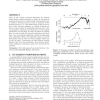Free Online Productivity Tools
i2Speak
i2Symbol
i2OCR
iTex2Img
iWeb2Print
iWeb2Shot
i2Type
iPdf2Split
iPdf2Merge
i2Bopomofo
i2Arabic
i2Style
i2Image
i2PDF
iLatex2Rtf
Sci2ools
CIKM
2008
Springer
2008
Springer
Suppressing outliers in pairwise preference ranking
Many of the recently proposed algorithms for learning feature-based ranking functions are based on the pairwise preference framework, in which instead of taking documents in isolation, document pairs are used as instances in the learning process [3, 5]. One disadvantage of this process is that a noisy relevance judgment on a single document can lead to a large number of mis-labeled document pairs. This can jeopardize robustness and deteriorate overall ranking performance. In this paper we study the effects of outlying pairs in rank learning with pairwise preferences and introduce a new meta-learning algorithm capable of suppressing these undesirable effects. This algorithm works as a second optimization step in which any linear baseline ranker can be used as input. Experiments on eight different ranking datasets show that this optimization step produces statistically significant performance gains over state-of-the-art methods. Categories: H.3.3 Information Search and Retrieval: Retrie...
CIKM 2008 | Document Pairs | Feature-based Ranking Functions | Information Management | Pairwise Preferences |
| Added | 12 Oct 2010 |
| Updated | 12 Oct 2010 |
| Type | Conference |
| Year | 2008 |
| Where | CIKM |
| Authors | Vitor R. Carvalho, Jonathan L. Elsas, William W. Cohen, Jaime G. Carbonell |
Comments (0)

